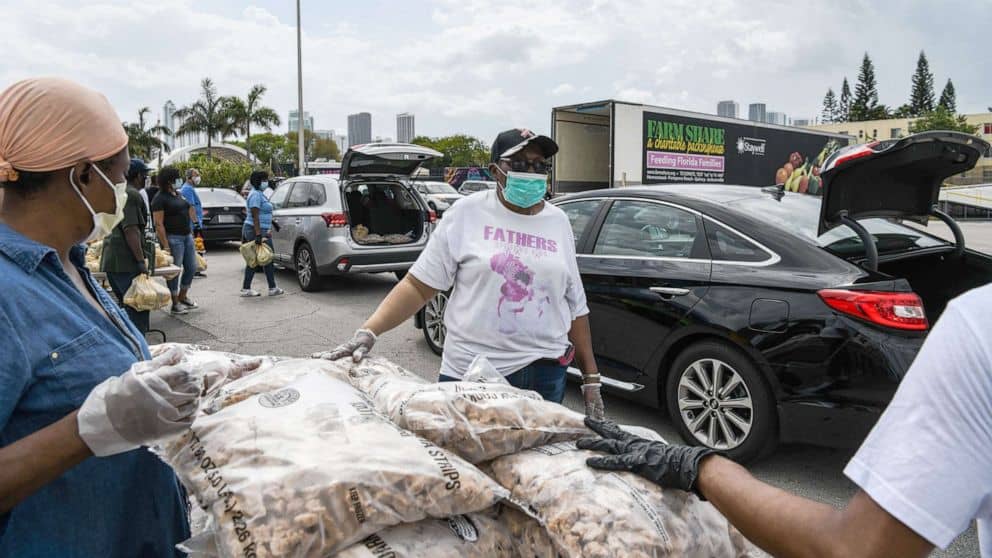For most people living under lockdowns and curfews, the COVID-19 pandemic feels like the most historic moment in their life. Others recognize the legitimate possibility that the pandemic could be a minor footnote in history. The future could recall one of humanity’s biggest catastrophes unfolding in 2020 with little collective response.
A famine of ‘biblical’ proportions
Without immediate action, 2020 could see one of the world’s largest preventable disasters in history, warns David Beasley, executive director of the World Food Programme (WFP). Locust swarms, droughts, and economic crises could endanger the lives of millions without intervention, according to the WFP chief.
Even now, the WFP feeds 100 million people every day, and 30 million depend on the program to stay alive. Every night 821 million people go to bed hungry and the coming famine could increase that number to approximately 1 billion.
The conflicts in Libya, Syria, and Yemen continue to exacerbate food insecurity, which has become a daily concern for locals. In Africa, giant swarms of locusts destroy crops and create economic devastation. Economic crises as seen in Lebanon, the Democratic Republic of Congo, and Ethiopia could further exacerbate the impending doom scenario.
Just so sobering: @WFPChief David Beasley says 2020 was already shaping up to be the worst humanitarian crisis year since WWII, with worldwide fighting, climate extremes, cyclones, and the like. Then came locusts. THEN came the coronavirus: https://t.co/nTDMVxKIxh
— Ali Rogin (@AliRogin) April 23, 2020
A cycle of crises
In 2019, hunger and drought were already significant problems Climate change and economic inequalities continued to drag humanity closer to disaster. Last year’s food crises were most severe in Afghanistan, the Democratic Republic of Congo, Ethiopia, Haiti, Nigeria, South Sudan, Sudan, Syria, Yemen, and Venezuela. The COVID-19 pandemic has only exacerbated the problem as international institutes and national governments remain occupied with combating the pandemic.
“In a worst-case scenario, we could be looking at famine in about three dozen countries,” Beasley said, adding that “in 10 of these countries we already have more than one million people per country who are on the verge of starvation.”
The COVID-19 pandemic is set to worsen the hunger crisis as economic consequences from lockdown measures hurt the economically vulnerable the most. The economic crisis, dubbed the “great lockdown” by the IMF, will have devastating consequences for the poor as a drop in remittances and tourism affects those in greatest need.
Even without the COVID-19 crisis, Beasley said, “our analysis shows that 300,000 people could starve to death every single day over a three-month period.”
As I just explained to the @UN Security Council, we’re on the verge of a hunger pandemic caused by the #coronavirus. If we don’t act NOW, we could be facing MULTIPLE famines of biblical proportions within a few short months.
Read my statement below.
— David Beasley (@WFPChief) April 21, 2020
Now or never
To avert mass starvation, the international community must act immediately. “The truth is, we do not have time on our side, so let’s act wisely — and let’s act fast,” the WFP director said. In order to stave off a “hunger pandemic,” countries must work together to protect those in danger.
The World Food Programme plays a major role in combating the pandemic as it controls most of the UN’s practical logistics. On behalf of the WHO, WFP is delivering millions of pieces of protective medical equipment, testing kits, and masks to 78 countries. Beasley hopes the WFP’s logistical expertise could be put to good use in stopping the pending calamity.
Beasley expressed optimism that investment in food programs could provide the required aid, saying, “I do believe that with our expertise and partnerships, we can bring together the teams and the programs necessary to make certain the COVID-19 pandemic does not become a humanitarian and food crisis catastrophe.”
Yemen, South Sudan, DRC: What these 3 countries all have in common is conflict. Crippling civil unrest. The longer the fighting, the less likely people are to escape from relentless hunger.
Now, add #coronavirus to the mix – and we’re looking at a hunger pandemic. More below.
— David Beasley (@WFPChief) April 23, 2020

